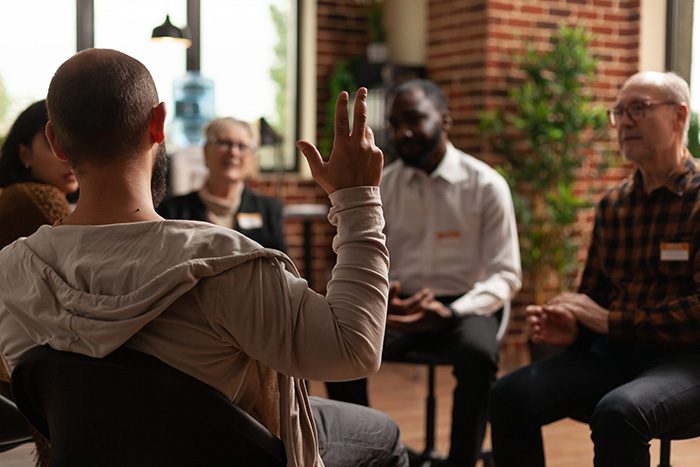Learning how to build healthy relationships in recovery is an important part of long-term healing. Early recovery often brings changes in routines, boundaries, and emotional awareness, which can affect relationships with partners, family members, friends, and coworkers. While rebuilding connections can feel challenging, establishing healthier relationships can provide stability, accountability, and meaningful support throughout the recovery process.
At Outpatient Los Angeles, we understand that recovery is not just about stopping substance use—it’s about learning new ways to relate with yourself and others. Our programs help individuals improve communication, develop emotional regulation skills, and learn to set boundaries that support both recovery and healthier relationships.

Why Relationships Matter in Recovery
Substance use can strain relationships. It can lead to broken trust, miscommunication, or emotional distance. Once in recovery, individuals often begin to recognize how patterns such as people-pleasing, avoidance, or conflict have shaped their relationships.
Learning to build healthier relationships often involves unlearning old habits and practicing new skills—especially during early sobriety, when emotions can feel more intense, and boundaries may still be forming.
Connection with others is vital to our wellness. In fact, community is one of the four major dimensions that support life in recovery according to SAMHSA (Substance Abuse and Mental Health Services Administration). They define community as “Relationships and social networks that provide support, friendship, love, and hope.” Healthy relationships are not about perfection. They are about safety, honesty, and mutual respect.
Core Skills for Building Healthy Relationships in Recovery
One of the most important skills in recovery is boundary setting. Boundaries help individuals protect their sobriety, manage stress, and clarify expectations in relationships. Healthy boundaries may involve limiting contact with people who enable substance use, saying no to situations that feel overwhelming, or communicating needs clearly and calmly.
Communication skills are also essential. Many people in recovery are learning how to express feelings without substances, which can feel unfamiliar at first. Evidence-based approaches such as cognitive behavioral therapy (CBT) and skills-based counseling help individuals develop healthier ways to listen, speak, and resolve conflicts.
Building healthy relationships is an ongoing process, not a single achievement. As individuals grow emotionally and develop greater self-awareness, relationships often evolve as well. Some connections strengthen, others change, and new relationships may form that better align with recovery values.
At Outpatient Los Angeles, our outpatient programs support individuals as they navigate these changes. Through therapy, group support, and skills-building, we help clients create healthier relationship patterns that support sobriety, mental health, and long-term well-being.
FAQs About Healthy Relationships in Recovery
Early recovery involves major emotional, physical, and behavioral changes. Many people are learning how to experience and express feelings without substances for the first time, which can make interactions feel more intense or unfamiliar. Relationships may also be adjusting to new boundaries, routines, and expectations. These challenges are common and don’t mean something is wrong—they often reflect growth and the process of learning healthier ways to connect.
Guilt is a common emotion when setting boundaries, especially for people who are used to prioritizing others’ needs over their own. In recovery, boundaries are an important tool for protecting your emotional well-being and sobriety. Setting boundaries does not mean rejecting others; it means being honest about your own limits. Practicing clear, respectful communication can help reduce guilt and eventually strengthen relationships.
Yes. Recovery often brings changes in values, priorities, and lifestyle, which can naturally affect existing relationships. Some connections may feel less supportive as substance use decreases and healthier patterns develop. Outgrowing a relationship does not mean it was wrong or harmful; it may simply no longer align with your recovery needs. Letting go or creating distance can be part of building a healthier support system.
Therapy provides a safe space to explore communication patterns, emotional triggers, and past relationship experiences. Many people use therapy to practice expressing needs, managing conflict, and setting boundaries in healthier ways. Over time, therapy can help increase emotional awareness and confidence, making it easier to build and maintain supportive relationships in recovery.
Yes. Family relationships can heal, but the process often takes time, patience, and consistency. Rebuilding trust may involve open communication, accountability, and demonstrating reliability over time. Family therapy or guided conversations can help address misunderstandings and repair strained connections.
Peer support groups offer connection with others who understand recovery challenges firsthand. These relationships can reduce feelings of isolation and provide encouragement during difficult moments. Peer settings often model accountability, honesty, and mutual respect, which can help individuals practice healthier relationship skills. Many people find that peer support complements their work in therapy and strengthens their recovery.
Learning to handle conflict without substances may take practice and support. Skills such as pausing before reacting, identifying emotions, and communicating needs calmly can make conflict feel more manageable. Many recovery programs teach emotional regulation and problem-solving strategies to support healthier responses. These tools can help reduce escalation and build confidence in navigating difficult conversations.
Yes. Relationships marked by high stress, substance use, or emotional instability can make recovery more challenging. Unhealthy dynamics may increase triggers, cravings, or emotional distress. In contrast, supportive relationships that respect boundaries and recovery goals can provide stability. Identifying which relationships support recovery is an important part of relapse prevention.
Outpatient treatment allows individuals to work on relationship skills while staying engaged in daily life. Therapy and group sessions provide guidance, feedback, and accountability as clients practice communication and boundary-setting in real-life situations. This ongoing support helps individuals gradually apply new skills, making relationship growth more sustainable over time.
There is no single right answer. Some people choose to repair existing relationships, while others focus on building new connections that better support their recovery. We would encourage you to consider whether a relationship feels safe, respectful, and aligned with recovery goals. Therapy can help individuals evaluate which relationships are healthy to maintain and which may require boundaries or distance.


















